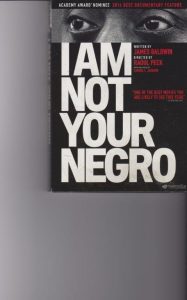“Humankind cannot bear much reality.”–T.S. Eliot
I Am Not Your Negro was a worthy nominee for AA 2016 Best Documentary Feature and has just been released on DVD. Certainly this film is a must-see for black American viewers in search of more information on their racial history in the U.S. As a Canadian white viewer and a long-time observer of Black American, literature, music, and culture, I found this powerfully-filmed record to be a fantastic introduction to James Baldwin, his work, his thinking, and his sensibility. The film truly gets inside Baldwin and turns him inside out for whoever sees this documentary.
Raoul Peck, the director, for his part, has found vivid images and colors to represent Baldwin and his work and made a good choice of a somewhat untypically quieter, nonetheless emotional Samuel L. Jackson for the narrator and as the voice of Baldwin.
I think one of the best ideas that emerges from I Am Not Your Negro is the view that white people of Baldwin’s time (and maybe some of ours today still) project their images of blacks back onto blacks in terms of action and response. The other strong, related idea is that actual, lived black reality is completely divorced from Madison Avenue and Hollywood social projections, reflected in many examples judiciously offered by Peck.
Throughout the film, we also see Baldwin speaking to groups (one, amazingly, an all-white young male group) and on television; in both, he is very forthright and no-nonsense, cutting through a lot of stupid, superficial white questions, assumptions, and observations.
I should also mention Baldwin’s response to the lives and deaths of Medgar Evans, Martin Luther King, and Malcolm X, three of his key influences who evoked destructively negative white reactions; this was, incidentally, the starting point of his last, unfinished work. Baldwin shows himself, throughout his life, to be a man of great sensitivity, who felt deeply and movingly the irrational hate and injustices of white Americans toward his people.
Not your average documentary for sure, but this one does a super job in reviving Baldwin’s relevance and his influence on the continuing story of prejudice and discrimination toward blacks in America. Highly recommended. Even if you consider yourself to be a liberal, this movie will illuminate much of what still, tragically, goes on today. And if you know nothing of Baldwin, this is a terrific, informative introduction to why he remains so significant some 60 years on.

